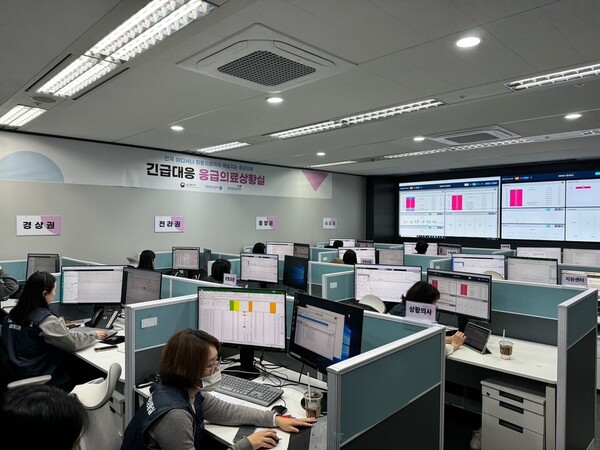The government has begun to operate an emergency operation center (EOC) to support the transfer of emergency patients among hospitals in response to trainee physicians’ massive walkouts.

To deal with doctors’ collective action, the Ministry of Health and Welfare said it began operating the EOC, a temporary organization that supports the transfer of emergency patients between medical institutions, on Monday.
As the demand for patients’ transfer between hospitals is expected to increase due to the resignation of interns and residents, the EOC was set up at the National Medical Center (NMC)'s Central Emergency Medical Center as a stopgap measure, officials said.
The government also plans to open the Regional Emergency Operation Centers in four areas -- the Seoul metro region, Chungcheong provinces, Jeolla provinces, and Gyeongsang provinces -- by May as a countermeasure against non-acceptance of patients by emergency rooms.
If a patient in an emergency room needs transfer, the medical professional can directly request transfer support to the EOC, which will select an appropriate hospital to receive the patient within the region, considering the severity of the illness, the availability of final treatment at the hospital, and the hospital's capacity.
To increase patient acceptance, the government will give additional incentives to hospitals that accept emergency patients from other hospitals.
The EOC will be staffed by more than 70 people, including physicians and emergency personnel, in 24-hour shifts.
On Feb. 29, the central headquarters decided to deploy 12 public health doctors to the EOC to urgently fill the shortage of doctors caused by the early opening of the EOC.
The public health doctors will play a key role in the overall operation, including selecting the appropriate hospital based on a comprehensive assessment of the patient's severity and the treatment and care required.
"The EOC, which transfers patients and coordinates hospitals in emergency medical situations, is expected to ensure that emergency patients receive timely treatment," said Jung Tong-ryong, head of the EOC. "We will closely monitor the operation of the EOC and do our best to ensure that emergency patients are treated at appropriate medical institutions."
Related articles
- Korean medical crisis escalates as government starts suspending striking doctors' licenses
- University leaders, medical professors clash over med school enrollment quotas
- WMA urges Korean government to ‘stop forceful measures against medical community’
- 'Junior doctors defying Seoul's return-to-work order could face legal liability for medical error'
- Korea's med school craze: 3,093 students applied for 5 additional spots
- Seoul moves to ease penalty on medical malpractice to placate physicians
- Korea mobilizes over ₩200 billion per month to maintain emergency care

